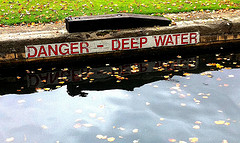
One of my kids studied Classics at school, and I’ll never forget the moment when, deep in a textbook at the dining-room table, he suddenly said: “Dad, I get it. Tragedy is when you can see the terrible thing that’s coming but you know that nobody can do anything about it.” This is a perfect description of the Eurozone fiasco — as demonstrated by this morning’s news that the laboriously-stitched “deal” to stop a Greek default on its debt has now been upended by the Greek government’s decision to call a referendum on the deal. You don’t have to be a genius, let alone an economist, to see that the Euro project is doomed because — as many people, including Gordon Brown, pointed out at its inception — you can’t have a currency union without a political union. But because failure is unthinkable to the European political classes — this really is something that is “too big to fail”.
Anybody who doubts that Greeks are going to default just needs to read Michael Lewis’s splendid Vanity Fair piece, “Beware of Greeks Bearing Bonds” (which is on a par with his terrific piece about the Irish bank meltdown). He provides a really bleak insight into Greek society, and in particular what happens to a society where corruption is endemic.
As it turned out, what the Greeks wanted to do, once the lights went out and they were alone in the dark with a pile of borrowed money, was turn their government into a piñata stuffed with fantastic sums and give as many citizens as possible a whack at it. In just the past decade the wage bill of the Greek public sector has doubled, in real terms—and that number doesn’t take into account the bribes collected by public officials. The average government job pays almost three times the average private-sector job. The national railroad has annual revenues of 100 million euros against an annual wage bill of 400 million, plus 300 million euros in other expenses. The average state railroad employee earns 65,000 euros a year. Twenty years ago a successful businessman turned minister of finance named Stefanos Manos pointed out that it would be cheaper to put all Greece’s rail passengers into taxicabs: it’s still true. “We have a railroad company which is bankrupt beyond comprehension,” Manos put it to me. “And yet there isn’t a single private company in Greece with that kind of average pay.” The Greek public-school system is the site of breathtaking inefficiency: one of the lowest-ranked systems in Europe, it nonetheless employs four times as many teachers per pupil as the highest-ranked, Finland’s. Greeks who send their children to public schools simply assume that they will need to hire private tutors to make sure they actually learn something. There are three government-owned defense companies: together they have billions of euros in debts, and mounting losses. The retirement age for Greek jobs classified as “arduous” is as early as 55 for men and 50 for women. As this is also the moment when the state begins to shovel out generous pensions, more than 600 Greek professions somehow managed to get themselves classified as arduous: hairdressers, radio announcers, waiters, musicians, and on and on and on. The Greek public health-care system spends far more on supplies than the European average—and it is not uncommon, several Greeks tell me, to see nurses and doctors leaving the job with their arms filled with paper towels and diapers and whatever else they can plunder from the supply closets.
The conviction that the Euro is “too big to fail” is at the root of the wilful blindness now rife in Brussels. It must be clear to even the meanest intelligence that the Greeks will default. The only question is when it will happen. As Lewis puts it:
now rife in Brussels. It must be clear to even the meanest intelligence that the Greeks will default. The only question is when it will happen. As Lewis puts it:
The question everyone wants an answer to is: Will Greece default? There’s a school of thought that says they have no choice: the very measures the government imposes to cut costs and raise revenues will cause what is left of the productive economy to flee the country. The taxes are lower in Bulgaria, the workers more pliable in Romania. But there’s a second, more interesting question: Even if it is technically possible for these people to repay their debts, live within their means, and return to good standing inside the European Union, do they have the inner resources to do it? Or have they so lost their ability to feel connected to anything outside their small worlds that they would rather just shed themselves of the obligations? On the face of it, defaulting on their debts and walking away would seem a mad act: all Greek banks would instantly go bankrupt, the country would have no ability to pay for the many necessities it imports (oil, for instance), and the country would be punished for many years in the form of much higher interest rates, if and when it was allowed to borrow again. But the place does not behave as a collective; it lacks the monks’ instincts. It behaves as a collection of atomized particles, each of which has grown accustomed to pursuing its own interest at the expense of the common good. There’s no question that the government is resolved to at least try to re-create Greek civic life. The only question is: Can such a thing, once lost, ever be re-created?
We don’t know the answer to that question. But in a way it’s now beside the point. We need to be planning on the assumption of a default. But if it were known that the EU was planning for that contingency, then that information alone would trigger the catastrophe they are trying to avoid.
It makes Catch-22 look like a tea party. And as for Italy…




